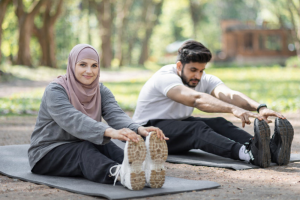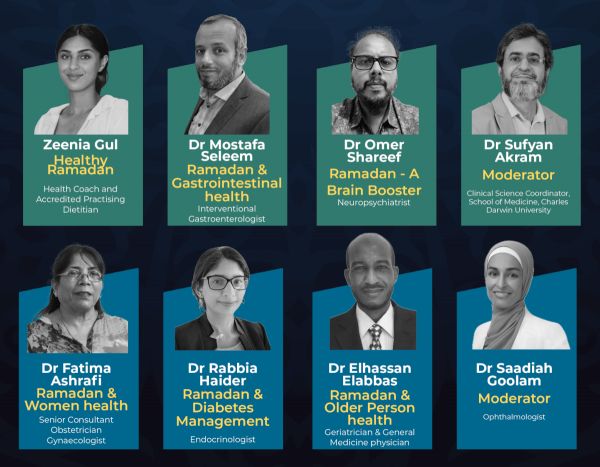
Optimising sleep during Ramadan: Science, faith and practical tips
Dr Omer Shareef, Neuropsychiatrist “And We have made the night and the day two signs… that you may know the number of years and the
Sunday 8 February 2026
Learn from experienced clinicians how to deliver safe, culturally responsive care for patients planning to fast during Ramadan, with case-based insights and Q&A.
Sunday 1 February 2026

Dr Omer Shareef, Neuropsychiatrist “And We have made the night and the day two signs… that you may know the number of years and the

By Zeenia Gul, Dietitian As Muslims around the world embrace the sacred month of Ramadan, nourishing our bodies wisely becomes a beautiful act of worship

By Mohamed Saad, Exercise Physiologist Staying active during Ramadan is essential for overall well-being. Although fasting changes eating, hydration, and sleep patterns, regular physical activity

By Doha Elbasha, Clinical Pharmacist Ramadan is a sacred month marked by fasting, sacrifice, worship, and spiritual reflection. Many people who fast live with health
This clinician’s guide offers insights and provides practical tips on how to help patients coordinate fasting with medical/clinical routines during Ramadan. It also includes other information including:
This community factsheet includes general tips on preparing physically and mentally for fasting, guidance on nutrition and hydration, and recommendations on seeking advice from a health professional to effectively manage medical conditions. It also emphasises the importance of seeking healthcare support when needed.
This is a compendium of evidence regarding fasting in Ramadan with health conditions undertaken by the British Islamic Medical Association (BIMA). This work builds upon the Ramadan Rapid Review, produced in 2020 in light of the COVID-19 pandemic. This work does not form a directive and should be used by individuals to frame an informed discussion with their clinicians. The views expressed represent the views of the author(s) and not necessarily those of BIMA and are not a substitute for professional advice.
Outline: Ramadan is the ninth month of the Islamic lunar calendar and is a period of spiritual significance for Muslims. Fasting during Ramadan is considered obligatory for those who can do so. Muslims who fast abstain from food, water, and sexual activity from dawn to sunset. As Ramadan is observed according to the lunar calendar, the first day of Ramadan moves forward by 11 days of the Gregorian calendar each year; therefore, depending on the season and location, fasting can last between 10 h and 20 h daily. Generally, each fast is initiated by a meal before dawn (suhoor) and ended with a meal at sunset (iftaar). Qualitative studies indicate that for many Muslims, the act of fasting during Ramadan is deeply valued and cherished.
The impact of Ramadan fasting, a type of intermittent fasting, on the manage- ment of diabetes has not been well investigated. Physical activity, sleep duration, and time of sleep are susceptible to alterations during Ramadan due to the changes in the times and numbers of meals. This study compared physi- cal activity and sleep patterns of individuals with type 2 diabetes mellitus (T2DM) during and after Ramadan using the international physical activity questionnaire (IPAQ) and a Fitbit Flex 2 accelerometer.

Held on Saturday 2 March 2024 and Saturday 9 March 2024
Amidst the anticipation and preparation for Ramadan, the Australian Islamic Medical Association (AIMA) organised two enlightening online webinars titled ‘Ramadan Health Talks.’
These sessions delved into the intricacies of health strategies tailored for Ramadan.